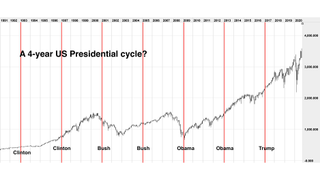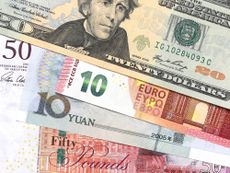Why investors should take cycle theories with a massive pinch of salt
Things move in cycles, and they can be useful for timing trades. But it's easy to become wedded to a particular cycle and make the wrong decisions. Dominic Frisby looks at some of their pitfalls.

Today we consider a technical tool about which I feel rather ambivalent: cycles.
The reason for my ambivalence is that they are so arbitrary. You can look back at history, project some kind of pattern, and declare it a cycle.
Once you’ve got the idea of a cycle in your head, it’s very hard to get rid of, to the point that you ignore all the other facts staring you in the face because you’re so bent on the cycle panning out as you foresaw it.
Subscribe to MoneyWeek
Subscribe to MoneyWeek today and get your first six magazine issues absolutely FREE

Sign up to Money Morning
Don't miss the latest investment and personal finances news, market analysis, plus money-saving tips with our free twice-daily newsletter
Don't miss the latest investment and personal finances news, market analysis, plus money-saving tips with our free twice-daily newsletter
I’ve fallen for it. And I’ve seen far greater minds than my own, each with their own pet cycle, make wrong investment decisions because they were so convinced that the cycle would pan out in a different way.
At the same time, things do move in cycles. The wheel of fortune spins. Sometimes things go your way, sometimes they don’t. Your life moves in a predictable cycle as you get older. The seasons of the year are cyclical. Every day is a cycle.
So is there any way to derive investment value from this basic truth?
Cycle theories are convincing – and that’s the most dangerous thing about them
Perhaps the most famous investment cycle of the lot is the Kondratiev Wave, named after economist Nikolai Kondratiev. After studying the 19th century, Kondratiev argued in his book The Major Economic Cycles (published in 1925), that an economy moved through three phases – expansion, stagnation and recession – over a 40-to-60 year period.
He found cyclical turning points when one phase moved to the next. I have no doubt, were he alive today (he was executed in Russia during the Great Purge of 1938), he would declare Covid-19 a cyclical turning point. Something changed then, that’s for sure.
But what Kondratiev failed to see is that humanity progresses: technology advances; productivity improves. As a result, life, at least in general terms, gets constantly better. We take for granted today – electricity, running water, the internet – what even a king did not have 100 or 150 years ago. So the oft-mooted depression never really comes.
Around 2008, I remember many Kondratiev acolytes declaring that we were headed into economic depression: a “Kondratiev winter” was here and the Dow would go to 1,000. It never happened. How many bad investment decisions were taken because so many were wedded to this notion?
When the cycle didn’t pan out as predicted, the reply came that it was distorted by money printing and interest rate suppression. Whatever! Kondratiev winter didn’t come, at least not in the way you predicted.
Another that did the rounds was the 18-year property cycle. Economist Fred Harrison was one of the main proponents of this.
Harrison wrote a brilliantly prescient article for MoneyWeek back in 2005 saying, just as many believed that UK house prices were on the verge of collapse, that property’s bull market had a few more years to run. He based his argument on a cycle he had identified going back hundreds of years in UK real estate – 14 years of bull market followed by four years of bear.
The problem is, while you can make this argument for the cycle generally, individual cases are so different that it’s pretty much impossible to trade. Theorists will look back and adjust the cycle a year or two either way and then say it’s an average – but try trading that in real time.
The presidential cycle and Frisby’s Flux
There’s the four-year US presidential cycle in US stocks. One of my mentors swore by this one. The idea here is that US stockmarkets are weakest in the year following the election of a new president. After the first year, the market improves and then the cycle begins again with the next presidential election.
Let’s put it to the test. CMC offers quite a cool cycle tool in its charting software and I’ve used it in the chart below to identify each January following the presidential election.

You could kind of make the argument that the cycle worked after the inauguration of Bush second time round, and Obama first time round, when the S&P 500 went to 666 in March 2009. But the S&P 500 went pretty much straight up – ie there was no cycle low in the first year – after the inaugurations of Trump, Obama (second time round) and Clinton (both times). It went down after Bush’s first inauguration and there was no cycle low until two years later.
It’s as good as useless!
I’ve identified an eight-year cycle in sterling – Frisby’s Flux – which still looks as though it may pan out. But trading it in real time has been nigh on impossible. Sterling was supposed to go up this year, according to the cycle. It has – but it went down first.
So the best I can say about cycles is have them at the back of your mind. But don’t make them your primary tool.
Sector allocation is the most important decision to make, far more than individual company choice. Even dogs fly in a bull market after all. So the first question you should be asking is: is this sector – tech stocks, oil, agribusiness, whatever the sector is – in a bull market or a bear market? And how mature is said bull or bear?
After all a bull market is a cycle, as is a bear market. They just don’t conform to the strict time frames that academics looking back at history would have you believe.
Dominic Frisby (“mercurially witty” – the Spectator) is the world’s only financial writer and comedian. He is MoneyWeek’s main commentator on gold, commodities, currencies and cryptocurrencies. He is the author of the books Bitcoin: the Future of Money? and Life After The State. He also co-wrote the documentary Four Horsemen, and presents the chat show, Stuff That Interests Me.
His show 2016 Let’s Talk About Tax was a huge hit at the Edinburgh Festival and Penguin Random House have since commissioned him to write a book on the subject – Daylight Robbery – the past, present and future of tax will be published later this year. His 2018 Edinburgh Festival show, Dominic Frisby's Financial Gameshow, won rave reviews. Dominic was educated at St Paul's School, Manchester University and the Webber-Douglas Academy Of Dramatic Art.
You can follow him on Twitter @dominicfrisby
-
 British Airways revamps Avios scheme bringing down flight prices to £1
British Airways revamps Avios scheme bringing down flight prices to £1With the new Avios part-payments scheme you can now bag a British Airways flight for as little as £1
By Oojal Dhanjal Published
-
 RBS to close a fifth of branches
RBS to close a fifth of branchesRoyal Bank of Scotland plans to shut 18 branches across Scotland, resulting in the loss of 105 jobs. We have the full list of closures.
By Ruth Emery Published
-
 What is FX trading?
What is FX trading?Tutorials What is FX trading and can you make money from it? Rupert Hargreaves explains how it works and the risks.
By Rupert Hargreaves Last updated
-
 The Burberry share price looks like a good bet
The Burberry share price looks like a good betTips The Burberry share price could be on the verge of a major upswing as the firm’s profits return to growth.
By Dr Matthew Partridge Published
-
 Why you should short this satellite broadband company
Why you should short this satellite broadband companyTips With an ill-considered business plan, satellite broadband company AST SpaceMobile is doomed to failure, says Matthew Partridge. Here's how to short the stock.
By Dr Matthew Partridge Published
-
 It’s time to sell this stock
It’s time to sell this stockTips Digital Realty’s data-storage business model is moribund, consumed by the rise of cloud computing. Here's how you could short the shares, says Matthew Partridge.
By Dr Matthew Partridge Published
-
 Netflix has plenty of life in it yet – here's how to trade the shares
Netflix has plenty of life in it yet – here's how to trade the sharesTips Netflix still has plenty of scope for growth, says Matthew Partridge, and the shares are reasonably priced. Here's how to play the Netflix share price.
By Dr Matthew Partridge Published
-
 Trading: Dunelm will keep growing, here's how to play it
Trading: Dunelm will keep growing, here's how to play itTips Furniture retailer Dunelm surged during the pandemic, but its shares have since fallen back. But it is well placed to take more market share from rivals, says Matthew Partridge. Here, he explains how to play the Dunelm share price.
By Dr Matthew Partridge Published
-
 Ashtead – a building equipment rental firm on solid foundations
Ashtead – a building equipment rental firm on solid foundationsTips The prospects for Ashtead, the building-equipment rental firm, are auspicious. Matthew Partridge explains the best way to play the share price.
By Dr Matthew Partridge Published
-
 A recruitment firm to bet on as the world gets back to work
A recruitment firm to bet on as the world gets back to workTips Recruitment consultant Hays has been volatile, but results are strong and trends encouraging. Matthew Partridge explains the best way to play the share price.
By Dr Matthew Partridge Published
